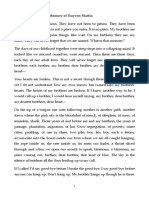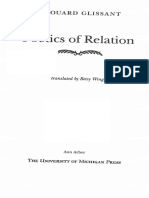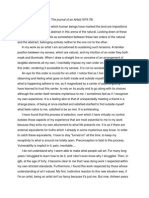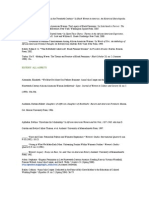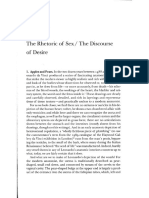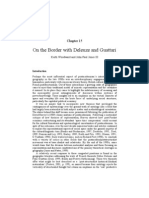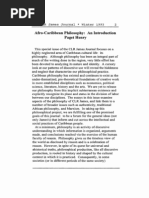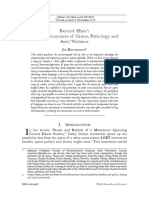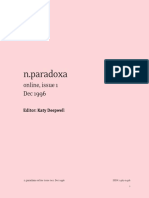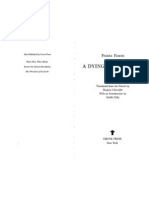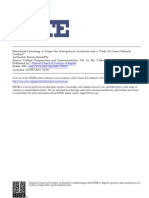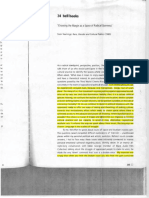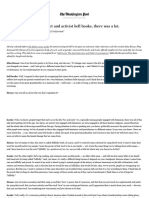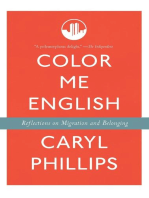0 ratings0% found this document useful (0 votes)
2K viewsBorderlands Anzaldua
Borderlands Anzaldua
Uploaded by
anamkRay Gwyn Smith: robbing a people of its language is more violent than war. "If you want to be american, speak 'American: If you don't like it, go back to Mexico where you belong," he says. He says the u.s. Has a long history of censorship of speech.
Copyright:
Attribution Non-Commercial (BY-NC)
Available Formats
Download as PDF, TXT or read online from Scribd
Borderlands Anzaldua
Borderlands Anzaldua
Uploaded by
anamk0 ratings0% found this document useful (0 votes)
2K views34 pagesRay Gwyn Smith: robbing a people of its language is more violent than war. "If you want to be american, speak 'American: If you don't like it, go back to Mexico where you belong," he says. He says the u.s. Has a long history of censorship of speech.
Original Title
borderlands-anzaldua
Copyright
© Attribution Non-Commercial (BY-NC)
Available Formats
PDF, TXT or read online from Scribd
Share this document
Did you find this document useful?
Is this content inappropriate?
Ray Gwyn Smith: robbing a people of its language is more violent than war. "If you want to be american, speak 'American: If you don't like it, go back to Mexico where you belong," he says. He says the u.s. Has a long history of censorship of speech.
Copyright:
Attribution Non-Commercial (BY-NC)
Available Formats
Download as PDF, TXT or read online from Scribd
Download as pdf or txt
0 ratings0% found this document useful (0 votes)
2K views34 pagesBorderlands Anzaldua
Borderlands Anzaldua
Uploaded by
anamkRay Gwyn Smith: robbing a people of its language is more violent than war. "If you want to be american, speak 'American: If you don't like it, go back to Mexico where you belong," he says. He says the u.s. Has a long history of censorship of speech.
Copyright:
Attribution Non-Commercial (BY-NC)
Available Formats
Download as PDF, TXT or read online from Scribd
Download as pdf or txt
You are on page 1of 34
Gloria Anzaldia
Borderlands
La Frontera
a
a send etn
Aunt Lute Books SAN FRANCISCO
5
How to Tame a Wild Tongue
“We're going to have to control
your tongue,” the dentist says, pulling out all the metal from my
mouth. Silver bits plop and tinkle into the basin. My mouth is a
motherlode.
The dentist is cleaning out my
roots. I get a whiff of the stench when I gasp. “I can’t cap that
tooth yet, you're still draining,” he says.
“We're going to have to do
something about your tongue,” I hear the anger rising in his
voice. My tongue keeps pushing out the wads of cotton, pushing
back the drills, the long thin needles. “I've never seen anything
as strong or as stubborn,” he says. And I think, how do you tame
a wild tongue, train it to be quiet, how do you bridle and saddle
it? How do you make it lie down?
“Who is to say that robbing a people of
its language is less violent than war?”
—Ray Gwyn Smith!
I remember being caught speaking Spanish at recess—that
was good for three licks on the knuckles with a sharp ruler. I
remember being sent to the corner of the classroom for “talking
back" to the Anglo teacher when all I was trying to do was tell her
how to pronounce my name. “If you want to be American, speak
‘American. If you don't like it, go back to Mexico where you
belong.”
“I want you to speak English. Pa’ hallar buen trabajo tienes
que saber hablar el inglés bien. Qué vale toda tu educacton st
76
How to Tame a Wild Tongue
todavia bablas inglés con un ‘accent;" my mother would say,
mortified that I spoke English like a Mexican. At Pan American
University, I, and all Chicano students were required to take two
speech classes. Their purpose: to get rid of our accents.
Attacks on one's form of expression with the intent to cen-
sor are a violation of the First Amendment. E/ Anglo con cara de
inocente nos arrancé la lengua. Wild tongues can't be tamed,
they can only be cut out.
Overcoming the Tradition of Silence
Abogadas, escupimos el oscuro.
Peleando con nuestra propia sombra
el silencio nos sepulta.
En boca cerrada no entran moscas. “Flies don't enter a
closed mouth’ is a saying I kept hearing when I was a child. Ser
habladora was to be a gossip and a liar, to talk too much.
Muchachitas bien criadas, well-bred girls don’t answer back. Es
una falta de respeto to talk back to one’s mother of father. I
remember one of the sins I'd recite to the priest in the confession
box the few times I went to confession: talking back to my moth-
er, hablar pa’ 'trds, repelar. Hocicona, repelona, chismosa, hav-
ing a big mouth, questioning, carrying tales are all signs of being
mal criada. In my culture they are all words that are derogatory
if applied to women—I've never heard them applied to men.
The first time I heard two women, a Puerto Rican and a
Cuban, say the word “nosotras,” was shocked. I had not known
the word existed. Chicanas use nosotros whether we're male or
female. We are robbed of our female being by the masculine
plural. Language is a male discourse.
And our tongues have become
dry the wilderness has
dried out our tongues and
we have forgotten speech.
—Irena Klepfisz?
Even our own people, other Spanish speakers nos quieren
oner candados en la boca. They would hold us back with their
bag of reglas de academia.
7
How to Tame a Wild Tongue
Oyé como ladra: el lenguaje de Ia frontera
Quien tiene boca se equivoca.
—Mexican saying
“Pocho, cultural traitor, you're speaking the oppressor's lan-
guage by speaking English, you're ruining the Spanish language,”
I have been accused by various Latinos and Latinas. Chicano
Spanish is considered by the purist and by most Latinos deficient,
a mutilation of Spanish.
But Chicano Spanish is a border tongue which developed
naturally. Change, evolucién, enriquectmiento de palabras
nuevas por invencién o adopcién have created variants of
Chicano Spanish, un muevo lenguaje. Un lenguaje que corre-
sponde a un modo de vivir. Chicano Spanish is not incorrect, it
is a living language.
For a people who are neither Spanish nor live in a country in
which Spanish is the first language; for a people who live in a
country in which English is the reigning tongue but who are not
Anglo; for a people who cannot entirely identify with either stan-
dard (formal, Castillian) Spanish nor standard English, what
recourse is left to them but to create their own language? A lan-
guage which they can connect their identity to, one capable of
communicating the realities and values true to themselves—a lan-
guage with terms that are neither espariol ni inglés, but both. We
speak a patois, a forked tongue, a variation of two languages.
Chicano Spanish sprang out of the Chicanos’ need to identi
fy ourselves as a distinct people. We needed a language with
which we could communicate with ourselves, a secret language.
For some of us, language is a homeland closer than the
Southwest—for many Chicanos today live in the Midwest and the
East. And because we ate a complex, heterogeneous people, we
speak many languages. Some of the languages we speak are:
Standard English
‘Working class and slang English
Standard Spanish
Standard Mexican Spanish
North Mexican Spanish dialect
Chicano Spanish (Texas, New Mexico, Arizona and
California have regional variations)
‘Tex-Mex
Pachuco (called cal6)
ay aes
ex
78
How to Tame a Wild Tongue
My “home” tongues are the languages I speak with my sister
and brothers, with my friends. They are the last five listed, with
6 and 7 being closest to my heart. From school, the media and
job situations, I've picked up standard and working class English.
From Mamagrande Locha and from reading Spanish and Mexican
literature, I've picked up Standard Spanish and Standard Mexican
Spanish. From los recién Hegados, Mexican immigrants, and
braceros, | learned the North Mexican dialect. With Mexicans I'll
try to speak either Standard Mexican Spanish or the North
Mexican dialect. From my parents and Chicanos living in the
Valley, I picked up Chicano Texas Spanish, and I speak it with my
mom, younger brother (who married a Mexican and who rarely
mixes Spanish with English), aunts and older relatives.
With Chicanas from Nuevo México or Arizona I will speak
Chicano Spanish a little, but often they don’t understand what
I'm saying. With most California Chicanas I speak entirely in
English (unless I forget). When I first moved to San Francisco, 'd
rattle off something in Spanish, unintentionally embarrassing
them, Often it is only with another Chicana tejana that I can talk
freely.
Words distorted by English are known as anglicisms or
pochismos. The pocho is an anglicized Mexican or American of
Mexican origin who speaks Spanish with an accent characteristic
of North Americans and who distorts and reconstructs the lan-
guage according to the influence of English.? Tex-Mex, or
Spanglish, comes most naturally to me. I may switch back and
forth from English to Spanish in the same sentence or in the same
word. With my sister and my brother Nune and with Chicano
tejano contemporaries I speak in Tex-Mex
From kids and people my own age I picked up Pachuco.
Pachuco (the language of the zoot suiters) is a language of rebel-
lion, both against Standard Spanish and Standard English. It is a
secret language. Adults of the culture and outsiders cannot
understand it. It is made up of slang words from both English and
Spanish. Ruca means girl or woman, vato means guy or dude,
chale means n0, simén means yes, cburo is sure, talk is
periquiar, pigionear means petting, que gacho means how
nerdy, ponte dguila means watch out, death is called Ja pelona.
Through lack of practice and not having others who can speak it,
I've lost most of the Pachuco tongue.
79
How to Tame a Wild Tongue
Chicano Spanish
Chicanos, after 250 years of Spanish/Anglo colonization have
developed significant differences in the Spanish we speak. We col-
lapse two adjacent vowels into a single syllable and sometimes
shift the stress in certain words such as matz/maiz, cobete/
cuete. We leave out certain consonants when they appear between
vowels: lado/lao, mojado/mojao. Chicanos from South Texas pro-
nounced fas jas in jue (fue). Chicanos use “archaisms? words that
are no longer in the Spanish language, words that have been
evolved out. We say semos, truje, haiga, ansina, and naiden. We
retain the “archaic”, as in falar, that derives from an earlier b, (the
French halar ot the Germanic halon which was lost to standard
Spanish in the 16th century), but which is still found in several
regional dialects such as the one spoken in South Texas. (Due to
geography, Chicanos from the Valley of South Texas were cut off
linguistically from other Spanish speakers. We tend to use words
that the Spaniards brought over from Medieval Spain. The majori-
ty of the Spanish colonizers in Mexico and the Southwest came
from Extremadura—Hernén Cortés was one of them—and
Andalucia. Andalucians pronounce // like a y, and their d’s tend to
be absorbed by adjacent vowels: tirado becomes tirao. They
brought el lenguaje popular, dialectos y regionalismos.4)
Chicanos and other Spanish speakers also shift to y and
to s.5 We leave out initial syllables, saying tar for estar, toy for
estoy, bora for abora (cubanos and puertorriquenos also leave
out initial letters of some words.) We also leave out the final sylla-
ble such as pa for para. The intervocalic y, the Was in tortilla, ella,
botella, gets replaced by tortia or tortiya, ea, botea. We add an
additional syllable at the beginning of certain words: atocar for
tocar, agastar for gastar. Sometimes we'll say lavaste las vacijas,
other times /avates (substituting the ates verb endings for the aste).
We use anglicisms, words borrowed from English: bola from
ball, carpeta from carpet, mdchina de lavar (instead of lavado-
ra) from washing machine. Tex-Mex argot, created by adding a
Spanish sound at the beginning or end of an English word such
as cookiar for cook, watchar for watch, parkiar for park, and
rapiar for rape, is the result of the pressures on Spanish speak-
ers to adapt to English.
We don’t use the word vosotros/as or its accompanying
verb form. We don't say claro (to mean yes), imaginate, or me
You might also like
- 1nc 4Document20 pages1nc 4jim tannerNo ratings yet
- Claudia Rankine - Citizen - An American LyricDocument2 pagesClaudia Rankine - Citizen - An American LyricAmirreza DadipoorNo ratings yet
- Dawn Lundy MartinDocument5 pagesDawn Lundy MartinNina HoechtlNo ratings yet
- West - Black Postmodern PracticesDocument3 pagesWest - Black Postmodern PracticesGray FisherNo ratings yet
- Glissant. The Open Boat. Poetics of Relation.Document9 pagesGlissant. The Open Boat. Poetics of Relation.Alexis PalominoNo ratings yet
- An Interview With Michelle CliffDocument27 pagesAn Interview With Michelle CliffnilopezrNo ratings yet
- Day Book Anne TruittDocument6 pagesDay Book Anne TruittAngga Vlamino100% (1)
- Black Feminist Thought BibliographyDocument8 pagesBlack Feminist Thought BibliographynuilaNo ratings yet
- Howardena Pindell - A New LanguageDocument1 pageHowardena Pindell - A New LanguageArtdataNo ratings yet
- Baraka Return of The NativeDocument8 pagesBaraka Return of The NativeAnonymous FHCJucNo ratings yet
- Venus in Two ActsDocument14 pagesVenus in Two ActsRose FerreiraNo ratings yet
- Samuel R Delany - Rhetoric of Sex Discourse of DesireDocument38 pagesSamuel R Delany - Rhetoric of Sex Discourse of DesireLetitia RegardeNo ratings yet
- Think - On ItDocument5 pagesThink - On Itz78kidNo ratings yet
- Karl Ove Knausgård's Acceptence SpeechDocument15 pagesKarl Ove Knausgård's Acceptence SpeechAlexander SandNo ratings yet
- Moten - Harney.the University and The Undercommons.2004Document16 pagesMoten - Harney.the University and The Undercommons.2004Martha SchwendenerNo ratings yet
- Fulltext01 PDFDocument157 pagesFulltext01 PDFLiz Falero100% (1)
- On The Border With Deleuze and GuattariDocument14 pagesOn The Border With Deleuze and GuattariMarwan ZoueinNo ratings yet
- Concrete Poetry Mary Ellen SoltDocument42 pagesConcrete Poetry Mary Ellen SoltHend KhaledNo ratings yet
- Iyko Day - Being or NothingnessDocument21 pagesIyko Day - Being or NothingnessKat BrilliantesNo ratings yet
- (Scott Lauria Morgensen) Spaces Between Us Queer (B-Ok - Xyz)Document431 pages(Scott Lauria Morgensen) Spaces Between Us Queer (B-Ok - Xyz)Arnold Arnez100% (1)
- Straube, Toxic Bodies - Ticks, Trans Bodies, and The Ethics of Response-Ability in Art and Activist WritingDocument23 pagesStraube, Toxic Bodies - Ticks, Trans Bodies, and The Ethics of Response-Ability in Art and Activist Writing_diklic_No ratings yet
- LOVE Art Politics Adrienne Rich InterviewsDocument10 pagesLOVE Art Politics Adrienne Rich Interviewsmadequal2658No ratings yet
- Trap Door: Trans Cultural Production and The Politics of VisibilityDocument13 pagesTrap Door: Trans Cultural Production and The Politics of VisibilityLorena TravassosNo ratings yet
- Cosmic Pulses ProgDocument5 pagesCosmic Pulses ProgjosemusNo ratings yet
- Elite To Inclusive. Lysistrata and Gender, Democracy, and WarDocument142 pagesElite To Inclusive. Lysistrata and Gender, Democracy, and WarEra HeilelNo ratings yet
- Not in This Family: Gays and the Meaning of Kinship in Postwar North AmericaFrom EverandNot in This Family: Gays and the Meaning of Kinship in Postwar North AmericaNo ratings yet
- Thomas F. DeFrantz, Anita Gonzalez - Black Performance Theory-Duke University Press (2014)Document292 pagesThomas F. DeFrantz, Anita Gonzalez - Black Performance Theory-Duke University Press (2014)Bruno De Orleans Bragança ReisNo ratings yet
- 16 Uncanny The Singing That Comes From Certain HusksDocument6 pages16 Uncanny The Singing That Comes From Certain HusksMorgana PendragonNo ratings yet
- AR317 Critical Fabulation: Course DescriptionDocument4 pagesAR317 Critical Fabulation: Course DescriptiondolorescristinaNo ratings yet
- Afro Caribbean PhilosophyDocument10 pagesAfro Caribbean PhilosophyGisela Carlos FregosoNo ratings yet
- Moten - The Case of BlacknessDocument43 pagesMoten - The Case of BlacknessEric CheukNo ratings yet
- Kita Hall - PerformativityDocument5 pagesKita Hall - PerformativityRodrigo GonzalezNo ratings yet
- Jin Haritaworn (Chapter-3)Document35 pagesJin Haritaworn (Chapter-3)Charlie Abdullah HaddadNo ratings yet
- Unmournable Bodies - The New Yorker Teju ColeDocument4 pagesUnmournable Bodies - The New Yorker Teju ColeGaby ArguedasNo ratings yet
- Fred Moten Stolen Life Consent Not To Be A Single Being 1Document334 pagesFred Moten Stolen Life Consent Not To Be A Single Being 1m:mNo ratings yet
- Sisterhood and SurvivalDocument4 pagesSisterhood and Survivalyusra_65No ratings yet
- Cheng, The Melancholy of RaceDocument14 pagesCheng, The Melancholy of RaceIoana Miruna VoiculescuNo ratings yet
- N.paradoxa: Online, Issue 1 Dec 1996Document11 pagesN.paradoxa: Online, Issue 1 Dec 1996Fefa LinsNo ratings yet
- A Dying ColonialismDocument92 pagesA Dying ColonialismKenneth LeBlueNo ratings yet
- Rhetorical Listening - A Trope For Interpretive Invention and ADocument31 pagesRhetorical Listening - A Trope For Interpretive Invention and AMichael Meeder100% (1)
- Hospitality of the Matrix: Philosophy, Biomedicine, and CultureFrom EverandHospitality of the Matrix: Philosophy, Biomedicine, and CultureNo ratings yet
- The Erotics of Mourning in Recent Experimental Black PoetryDocument16 pagesThe Erotics of Mourning in Recent Experimental Black Poetryajohnny1No ratings yet
- HOOKS, Bell - Choosing The Margin As A Space of Radical Openness PDFDocument7 pagesHOOKS, Bell - Choosing The Margin As A Space of Radical Openness PDFPaulo Vitor SiffertNo ratings yet
- Adrian Piper PDFDocument30 pagesAdrian Piper PDFNickoKrisNo ratings yet
- Decolonizing DesignDocument12 pagesDecolonizing DesignrilsNo ratings yet
- Taking Steps Beyond Elegy: Poetry, Philosophy, Lineation and DeathDocument13 pagesTaking Steps Beyond Elegy: Poetry, Philosophy, Lineation and DeathWilliam WatkinNo ratings yet
- Moten, F. & Harney, S. - Debt and StudyDocument5 pagesMoten, F. & Harney, S. - Debt and StudyxdimitrisNo ratings yet
- Karen Barad - Natures Queer PerformativityDocument29 pagesKaren Barad - Natures Queer Performativityst_967446783No ratings yet
- The Archive As MetaphorDocument8 pagesThe Archive As MetaphorLara MartinaNo ratings yet
- Wynter Ceremony Must Be Found After HumanismDocument53 pagesWynter Ceremony Must Be Found After HumanismDavidNo ratings yet
- Cities of Dreams and Despair Utopia and Dystopia in Contemporary Brazilian Film and LiteratureDocument357 pagesCities of Dreams and Despair Utopia and Dystopia in Contemporary Brazilian Film and LiteraturePedro Fortunato100% (1)
- Waking Nightmares - Zakiyyah Iman JacksonDocument8 pagesWaking Nightmares - Zakiyyah Iman Jacksonabdu7777777No ratings yet
- Bell Hooks's Last Interview - An Excerpt - The Washington PostDocument6 pagesBell Hooks's Last Interview - An Excerpt - The Washington PostCeciliaNo ratings yet
- Graduate Syllabus Postcolonial Global WoDocument3 pagesGraduate Syllabus Postcolonial Global WocomsianNo ratings yet
- Color Me English: Migration and Belonging Before and After 9/11From EverandColor Me English: Migration and Belonging Before and After 9/11No ratings yet
- Monstrous Politics: Geography, Rights, and the Urban Revolution in Mexico CityFrom EverandMonstrous Politics: Geography, Rights, and the Urban Revolution in Mexico CityNo ratings yet

